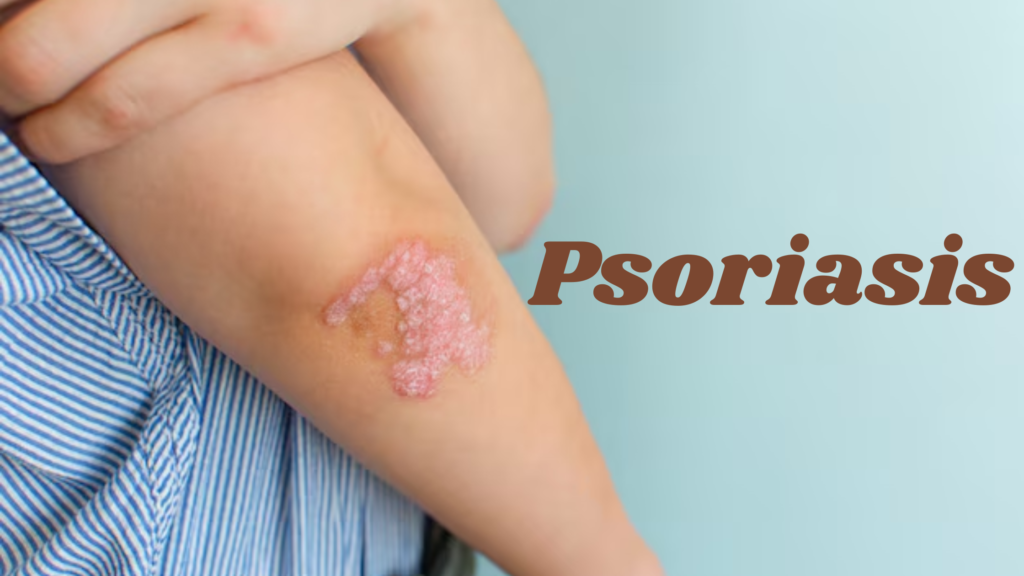Psoriasis is a chronic autoimmune disease that affects the skin, causing rapid skin cell turnover. Normally, skin cells grow and shed in a regular cycle over a few weeks, but in people with psoriasis, this cycle is much faster. As a result, skin cells build up on the surface of the skin, creating thick, scaly patches that can be red, inflamed, and sometimes painful.
What happens inside the body?
In a person with psoriasis, the immune system mistakenly attacks healthy skin cells. This leads to an overproduction of skin cells and inflammation. T-cells, a type of white blood cell, become overly active and trigger the skin cells to divide too quickly. Instead of taking about 28-30 days to regenerate, the process only takes about 3-4 days, resulting in a buildup of skin cells on the surface that don’t have time to shed properly.
Symptoms of Psoriasis:
- Plaques: Red or pink patches of skin covered with silvery scales.
- Itching or Burning: The affected areas can be itchy, painful, or even cracked and bleeding.
- Dry Skin: Flaky skin, especially on areas where the patches are.
- Nail Changes: Dents or pits in the nails, and sometimes discoloration.
- Swollen Joints: In some cases, psoriasis can lead to a form of arthritis called psoriatic arthritis.
- Flare-Ups & Remission: Psoriasis can get worse (flare-ups) and improve (remission) periodically, often triggered by stress, weather, infections, or medications.
Types of Psoriasis:
- Plaque Psoriasis (the most common): Characterized by raised, red patches with silvery-white scales.
- Guttate Psoriasis: Small, drop-shaped spots appear, usually after a throat infection.
- Inverse Psoriasis: Red, shiny lesions that appear in skin folds like under the armpits, groin, or behind the knees.
- Pustular Psoriasis: Characterized by white pustules surrounded by red skin.
- Erythrodermic Psoriasis: A rare but severe form that causes widespread redness and shedding of the skin.
- Psoriatic Arthritis: Involves both the skin and joints, causing pain, stiffness, and swelling.
Causes & Triggers:
Psoriasis is genetic, meaning it tends to run in families. However, environmental triggers can cause it to appear or worsen. These include:
- Stress: Emotional stress is one of the most common triggers.
- Infections: Throat infections or skin infections can trigger or worsen psoriasis.
- Weather: Cold, dry weather can lead to flare-ups, while sunlight can sometimes improve symptoms.
- Medications: Certain drugs (like beta-blockers, lithium, or antimalarials) can cause flare-ups.
- Skin Injury: Cuts, sunburns, or other skin trauma can trigger a flare (called the Koebner phenomenon).
- Diet: Some foods might trigger flare-ups for some people (like alcohol or spicy foods).
Is Psoriasis Contagious?
No, psoriasis is not contagious. You cannot “catch” it from someone else.
Managing Psoriasis:
While there’s no cure for psoriasis, various treatments can help manage symptoms and control flare-ups:
- Topical Treatments:
- Corticosteroids: Anti-inflammatory creams to reduce redness and scaling.
- Vitamin D analogs: Help slow skin cell turnover.
- Coal Tar: Reduces scaling and itching.
- Topical Retinoids: Vitamin A derivatives that help normalize skin cell growth.
- Phototherapy:
- Ultraviolet (UV) light treatment can slow skin cell turnover and reduce inflammation.
- Systemic Treatments (for moderate to severe cases):
- Biologic drugs: Target specific parts of the immune system to reduce inflammation and skin cell turnover (e.g., TNF inhibitors, IL-17 inhibitors).
- Oral medications: Drugs like methotrexate or acitretin that suppress the immune system or slow skin cell growth.
- Lifestyle Changes:
- Stress management: Techniques like meditation, yoga, or therapy can help reduce stress.
- Skin care: Moisturizing regularly to prevent dryness, using gentle skin care products, and avoiding hot water or harsh soaps.
- Diet: Maintaining a healthy diet can help reduce inflammation and support immune function.
Impact on Life:
Psoriasis is more than just a skin condition; it can have a significant impact on a person’s quality of life. It can affect self-esteem and social interactions, as people might feel self-conscious about their appearance. Moreover, living with psoriasis increases the risk for other health problems, such as cardiovascular disease, diabetes, and depression.
